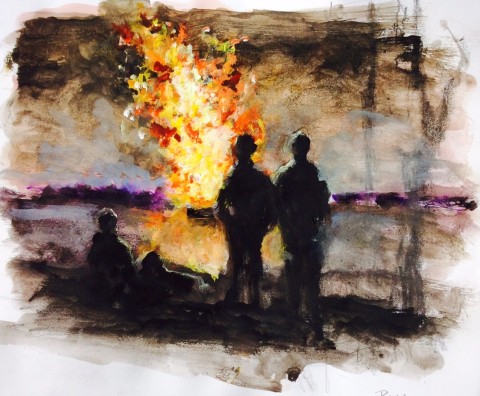For Dad’s 79th birthday we give him a mahogany casket with gold swing handles. It’s perfect because Dad only talks about his imminent demise. But he says, “I want a boat. When I’m still kicking, gas me up and push me out to sea. If you boys can’t manage a fiery arrow, throw Molotov cocktails till I catch.” He shoots us a wink.
“You’re not a Viking king,” we say. “And we won’t kill you.”
He spits into the velvet interior. “A raft would float better than this trunk.”
“It’s not a trunk. Lincoln, Custer and JFK all ended up in one. No matter how it goes, you end up in one. Why not play shuffleboard, make friends and relax.”
“How it goes.” His frown twists into a smile. “Get a pack of hungry Rottweilers or a guillotine, you cowards.”
We shake our heads and roll our eyes. We don’t indulge his fantasies any more. We give him the casket partly because he needs to accept the boring reality of death and partly because we have begun to hate him. We wish he would just lie down inside, seal the casket and stop fighting. He should have died earlier; he had plenty of opportunities: wars, a policeman’s beat, burglaries, and bad neighborhoods. He won’t admit it but a warm bed scares him. He has nightmares of catheters, the slow clip-clip-clip of oxygen machines.
“Yank the scraps from the beast’s jaws,” he says. “I want you each to have a limb.”
“Isn’t the casket nice? Hemingway was buried in a casket just like this one.”
“Ernie didn’t go to ground in one of these.”
“Well, he wasn’t devoured by lions.”
Dad is confused again. We know the look. His whiskery jaw unhinges and bobbles from left to right like a cow; his thick brow, same as ours, furrows into an angry comma. His mind is a labyrinth with passageways that open and close on a whim. Over the past week, he has recalled losing his virginity to his ninth grade teacher, Mrs. Stephanopoulos, in excruciating detail at least four times, while forgetting pants five mornings in a row. He shouts the perks of back hair on women from behind a lectern of stained-yellow tighty whities.
“You want to stuff me away in this snuff box.”
“The sooner, the better,” we say.
“Hem never rests, and I’ll never rest. You think I’m just going disappear.” He smiles and raps his fist against the casket. “I don’t think so.”
But later, he asks again and this time we don’t laugh. We assure him. Yes, Hemingway is dead and buried in a “trunk” just like his. Dad is confused but nods. Instead of his nightly wax on our wretchedness of trying to pack him away by making him comfortable and happy, Dad folds his hands over his stomach and watches the television. He’s quiet the entire evening. Eventually his eyes close and his mouth drops open. He pipes out snores that ripple and pop terrible fireworks.
Later, something crashes and wakes us in our beds. From the stairs, we see light under the dining room door.
A stranger stands over the casket gripping an axe. Taller and stronger than any of us, his bathrobe is rolled up his forearms, which flex like fat hams. His hair is silver and wild. It’s our dad, but it’s not. This father of ours fills his robe and strides without a limp. We have never seen anything scarier.
“Chop a bundle for Daisy, two for Ms. Maisy and how do you do Boise?”
He swings the axe with all his hate. It breaks the face of the casket. He jerks the blade free then swings it into the casket’s side.
“Don’t wear yourself out, Dad,” we say, our butts press the wainscoting, outside the axe’s wheelhouse.
He knocks a piece of mahogany off the axe. “Time for bed, my little Pinocchioes” he says. We march back to bed without a complaint.
In the morning, the wood is dented and a few panels lie on the ground. The velvet interior has been shredded and left in cotton candy bunches. The frame, however, remains intact, and Dad is crumpled on the floor, eyes open, mouth open and quiet.
We bury his battered casket below a hill overlooking nothing. There’s no service or flowers. Afterwards, we steal a dinghy and stack a pyramid of Hemingway and other myths around him. We douse it with gasoline, light the corners and push the dingy out. The tide pulls and the fire catches. The flames echo in the waves. A jogger pauses at the smoke then runs on. The gold clashes against a murky sky of purple. It lasts until the very end, when night falls, and we can no longer see him.



 The core workshop of SmokeLong Fitness is all in writing, so you can take part from anywhere at anytime. We are excited about creating a supportive, consistent and structured environment for flash writers to work on their craft in a community. We are thrilled and proud to say that our workshop participants have won, placed, or been listed in every major flash competition. Community works.
The core workshop of SmokeLong Fitness is all in writing, so you can take part from anywhere at anytime. We are excited about creating a supportive, consistent and structured environment for flash writers to work on their craft in a community. We are thrilled and proud to say that our workshop participants have won, placed, or been listed in every major flash competition. Community works.